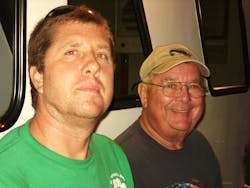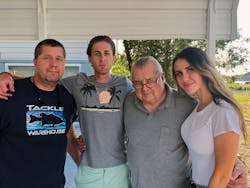I remember years ago as an apprentice, someone told me, “Only God and electricians can make light.” My intention in this piece isn’t to compare us to any higher power (no pun) or to upset anyone’s religious beliefs. My point is that we (as electricians) have a capability that extends far beyond the abilities of most people. Without us and our training, nights would be dark except for candlelight – and there aren’t enough whales left to burn their fat in lamps on our tables.
In high school I failed all four semesters of Algebra, and never loved the complexity of math. Despite this fact, I can light someone’s home and use complex mathematical equations to do it safely and correctly.
To call someone a “carpenter” barely defines their trade. Anyone who can use a hammer can be a carpenter. It’s so generic, but it includes a person who roughly builds concrete forms or hangs sheetrock to a master woodworker or millwright who can do the finest and most precise installation of beautiful woodwork in places we visit.
But for someone to be called an “electrician” is to recognize the profession that they have chosen. Being in the electrical profession means that we are scientists, mathematicians, mechanics, engineers, installers, designers, and experts. The list is endless, and our abilities/knowledge are limited only by our imagination or determination.
If you ever want proof of this, spend an evening in Epcot, where every single light in every single building dims at the same time, and lasers appear from rooftops and light up the sky with a brilliant show. Think about the complexity of making that happen. While some spectators cluelessly watch the show, stand in awe of the brilliant minds that made this happen — all of them electricians. Go to a concert, watch an amazing light show, and know that it is only possible to control thousands of watts of lighting and trigger pyrotechnics with the push of a button because of electricians behind the scenes.
Back to the question: “Why are we electricians?” For some, it is a trade that they were taught in a vocational school while in high school. We were given the “opportunity” to learn a trade because we were written off by teachers and students for not being jocks or brainiacs, and I highly doubt that ANY of us were ever voted “Most Likely to Succeed.” If by some remote chance you were, I will personally come shake your hand because you truly are an enigma!
For some, it is a way to rise above their current living conditions, make a decent wage, and be able to provide a comfortable living for their family, and work in a profession with pride. I personally have such admiration for their determination; they are usually the hardest workers because nothing was given to them. They truly earned the title.
I was born into the industry and surrounded by what it provided for myself and my siblings growing up. My father, John Kostick, Jr. was an electrician. As a child, I spent many hours learning things that seemed completely unrelated; however, I now realize they were lessons in understanding how to master the trade. He never paid anyone to fix anything. He did it himself with me at his side holding the flashlight. When he wasn’t home, I would dig through his old tools and build or deconstruct things, always with tools in my hand. I learned so much, although I took it for granted. I could look at a bolt or nut and know if it was ¼-in. hardware, which means without even thinking I would grab a 7/16-in. wrench. I learned about repairing TVs and bringing a handful of tubes to the store, using the tube tester to see which one was bad. I learned how to use hardware and building materials that eventually became so important in understanding how and where to install things — always planning ahead knowing that other trades would follow and to stay out of their way. I began collecting tools to the point that I can barely walk through my shop now!
Being an electrician is a passion deep within me that has led me down a path in which there are endless things to know. I don’t think anyone (except for Mike Holt, maybe) knows everything there is to know in this industry.
I have been fortunate in my career to have built buildings from the ground up that grace the New York City skyline. I ran miles of pipe and wire in any situation you could imagine — even in conditions where you would pick up a stick of pipe and a mouse or rat would run out of the other end. I spent years as a layout man, where I immersed myself so deeply into the drawings of every trade to avoid sprinkler hits or setting elevations to a fraction of an inch because eventually, finished wood details would frame an expensive piece of artwork that needed to be lit. I’ve laid out the lighting in the ceilings of ballrooms in the finest hotels, where the ceiling itself was a piece of art, consisting of multiple elevations and elaborate plaster details wrapped in gold. I’ve installed data systems starting with the old Type 1 IBM connectors and Wang cable and installed/tested miles of fiber optic cables. I’ve installed fire alarm systems, including many floors of the World Trade Center Towers. I’ve designed and installed elaborate dimming systems for stage lighting and power systems for the mobile recording industry in the very trucks that broadcast every major awards show. I’ve welded and fabricated tools or hardware that couldn’t be bought off the shelf. I’ve dug miles of trenches and operated big machinery. I’ve installed huge generators and rewired wastewater treatment facilities and pump stations. I’ve tested and inspected all types of industrial equipment. I’ve been involved in arc flash studies and learned to coordinate equipment — and that not all equipment is UL rated to be compatible with other equipment, which can be an extremely expensive mistake to make. I’ve also hung ceiling fans for friends and re-insulated the old, crisp knob and tube wiring in acorn boxes where people install 100W light bulbs in a fixture and wonder why they smell something burning.
My entire life is electricity, and it blows me away to see the advancements in technology, safety measures, and endless specialties that never existed before that now employ electricians. When I mention the work I have accomplished or experienced, it’s not because I am in any way bragging or seeking recognition. Thanks to my dad, I have been fortunate enough to experience so many things others would never attempt. I pass this message along to my brothers and sisters in the electrical industry as a tribute of the lessons I learned from my dad.
My father passed away on May 19, 2022. Without him, life will never be the same. But when I look around me — and see the results of every lesson he taught me — I know he was proud that I not only followed in his footsteps, but also went way beyond anything he could have ever imagined. He was also a proud member of Local 3 IBEW for more than 60 years.
So as a fellow electrical professional, here are a few words of advice. Love what you do, take pride in it, and do things the right way without shortcuts so that you can sleep peacefully at night knowing someone else’s children are safe in a house you wired. Never stop learning. If you’re bored running Romex every day and drilling holes, then dig deeper into what this industry offers. If you do so, I can assure you that you will never be bored again. Teach what you know to whomever will listen, and encourage the new people to go as far as possible. And always be safe, so you can go home every night to your family and friends.
RIP Poppy
-- John Kostick
About the Author
John Kostick
Master Electrician
Kostick is a licensed master electrician in New Jersey and Delaware and has worked in the industry for 37 years. He is also a licensed electrical instructor in New Jersey and a certified fire instructor.


